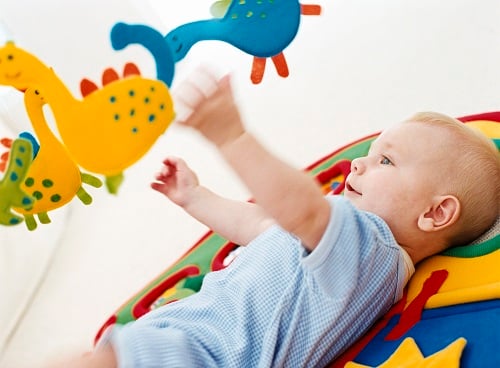As cute as ‘baby talk’ is, many parents would be overjoyed if their child was able to express his needs at a young age – the younger the better actually! But how exactly do we help our children to communicate effectively while they are still babies?
Wouldn’t it be great if your baby could communicate their needs to you while they are very young?
Here is some information to help encourage your little one to develop communication skills early on.
Starting Young
Some say it all begins in the womb. If you had “conversations” with your unborn child, he would take less time to get accustomed to your voice once he is born, and would instead, refocus his energy towards trying to understand what you are saying. This all means that his progress would be slightly faster than that of an infant who had not been exposed often to his parents’ voices while in-utero.
I recall fondly the times when my unborn son would swim vigorously within me when I would be trying to get some sleep. We would often read a short story to him, and then his father would stroke my swollen belly and coax him to lay still and allow me to sleep. The boy would always quieten down after that!
Show your baby how you feel through ‘visual language’
Showing them how you feel
Studies have shown that “visual language” – as in our facial expressions, the way our mouths move and body language – are a very important factor for babies to pick up speech and language.
Although most babies would not be able to speak until they are about 18-months-old, they would certainly be able to use their facial expressions to express how they feel. To assist them in being strong in “visual language” before they can speak, you can illustrate what you say with appropriate visual cues.
If you say “yes”, nod your head as you say it. When you say “no”, shake your head at the same time.
They will slowly learn to association these simple head movements to the word – and the meaning behind it – and be able to answer simple questions before they turn a year old.
Enlisting communicative aids
If the idea sounds appealing to you, you may even choose to teach your baby to sign. Baby signing materials such as books, flash cards and videos are readily available in bookstores and can help your child communicate his basic needs to you via hand signs. There are even baby signing classes conducted in Singapore.
It is important to note, however, that not all babies respond well to picking up sign language. Some are simply not interested, while others are keen on learning and start to use the signs fairly quickly.
Some babies will somewhat restrict themselves to only learning and using a few signs that they find “useful”, such as the signs for “milk”, “eat” and “hug”. But nonetheless, that means less frustration for everyone as they can now easily tell you when they want something in particular!
Encourage your child to learn to love reading and books
Going the long haul
The key to encouraging your baby to communicate early is allowing him to “speak”. Creating opportunities for him to respond to you would motivate your baby to pick up communication skills sooner.
For example, asking simple questions that require ‘yes’ and ‘no’ answers would prompt him to master nodding and shaking his heads.
You should also be consistent when talking to your baby so as not to confuse the little one, until he can fully understand language and its subtleties.
For example, it would confuse him greatly as to whether something is actually “nice” if you use the term in a sarcastic manner. Remaining consistent with what you say will enforce the same message to your child and him them to pick it up faster through repetition.
Patience will pay off
If your best efforts have not paid off yet, do not worry. Your child will incorporate all that you have taught him once he is ready. If you are speaking at least 2 languages to your child, it would take him a little bit longer to catch up on everything, due to a slight “information overload”.
Meanwhile, don’t stop talking to your little one as the more you speak to your child, the more he will learn from you. So keep on talking!
Last Published* April, 2023
*Please note that the published date may not be the same as the date that the content was created and that information above may have changed since.






